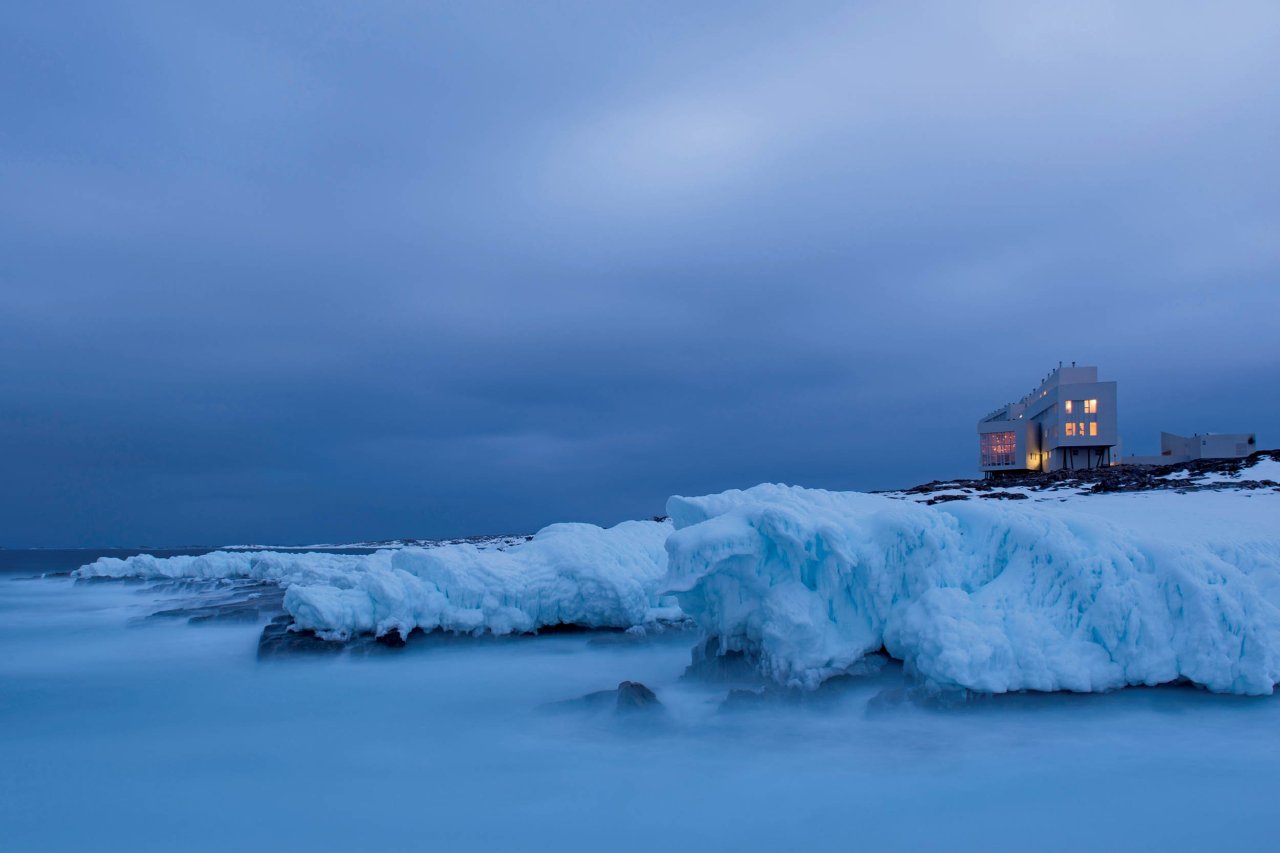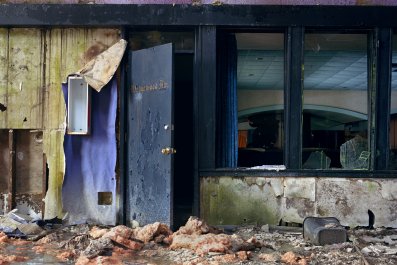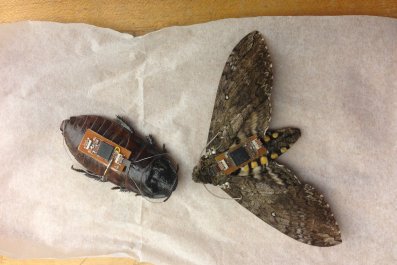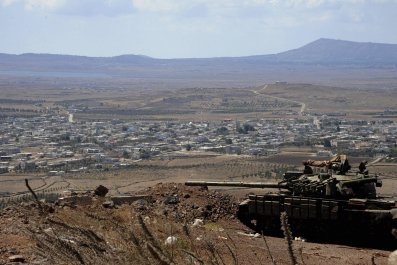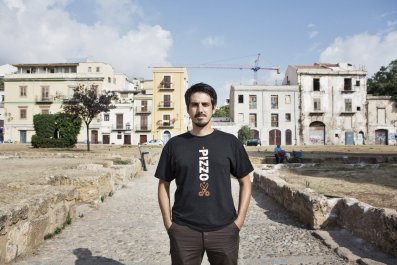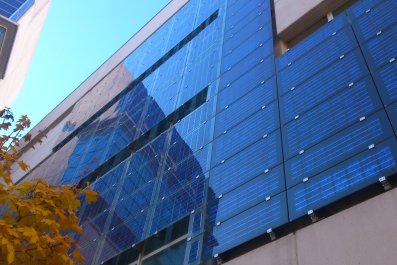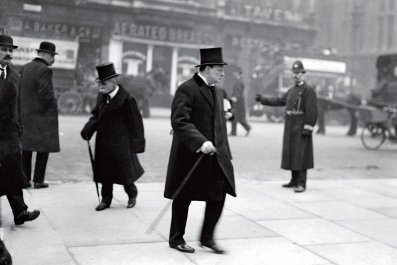As you loll atop a nap-inducing mattress covered by a locally hand-stitched quilt; as you lounge within one of Fogo Island Inn's 29 rooms, all with an ocean view; as you gaze out the windows that run floor to ceiling and wall to wall in this striking, snow-white edifice that seemingly glides above a granite outcrop…a vast realm of water arrests your oncoming slumber.
There before you, the North Atlantic, immense and eternal, bleeds into the horizon, its deep blue monochrome interrupted only by the occasional iceberg or islet (or, if you use the binoculars provided, a breaching humpback whale). You sit up: Closer and below, waves crash onto rocks that are 420 million years old.
As infinity pools at five-star resorts go, the one at Newfoundland's Fogo Island Inn is pretty tough to beat.

"Islands are special places," says Zita Cobb, the woman who begat the Fogo Island Inn, which opened in May 2013, "because they're places where dreams outlive time."
Cobb, 55, is a dreamer, but she's also a doer. A homegrown Fogo Islander who retired in her early 40s after earning tens of millions of dollars in the fiber-optics business, she returned to the place of her genesis and created from scratch one of the most stunningly beautiful and inspired inns you will ever happen upon. Not that anyone since the Norsemen or Captain James Cook has ever "happened upon" Fogo Island.
Almost every one of Cobb's 71 staffers at the Fogo Island Inn is a Fogo Islander. And almost all of them, like Cobb, had no prior experience in the hospitality industry. At least none they could put on a resume. "Newfoundlanders are innately, genetically hospitable people," says Cobb, "and I think it's because we're islanders. So we said, 'Let's build an inn.'"
So they did, a 40,000-square-foot, four-story edifice inspired by the local architecture of Fogo Island's plethora of fishing stages, small buildings that rest on stilts ("shores," they are called). The inn, like most stages, is perched on a promontory above the water. Rooms range from $875 to $2,875 per night, which keeps the globe-trotting hostel-hoppers away. As does the inn's location.
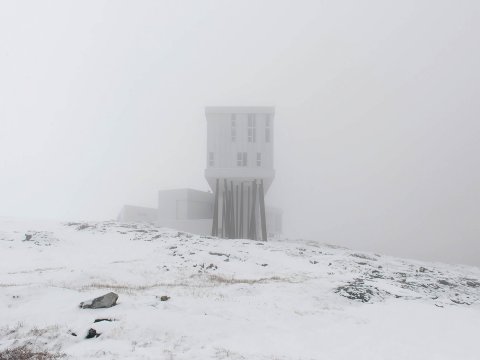
Fogo Island is not easily reached. It sits a 45-minute ferry ride off the northern coast of Newfoundland, which is itself an island. The landing from which the ferry launches is aptly named Farewell. There is no inhabited spit of land in North America that sits both farther north and east, and while, at 49 degrees north, it is latitudinally south of London, it feels arctic and primeval, a place out of time. A Brrr-igadoon, if you will.
"In early June, I looked out my window and counted 72 icebergs," says Paddy Barry, the inn's genial ambassador. Barry's observation informs you not only of Fogo Island's proximity to Iceberg Alley but that its inhabitants swallow time at their own pace.
Feral is the word Cobb most often uses to describe a childhood in which she grew up with six brothers in a three-bedroom house. Until the 1960s, Fogo Islanders, many of whose families have lived here since the time of the American Revolution, existed without electricity. Or running water. Or cash. "Fogo Islanders are not a capital-accumulating society," says Cobb, an eighth-generation Fogo Islander. "I grew up in the 19th century."
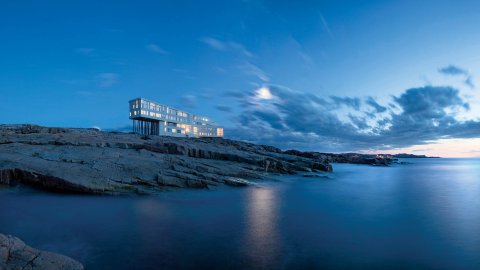
The island's 2,700 residents share a land mass four times the size of Manhattan with 500 or so caribou. There is not a single traffic light, though there is an indoor hockey rink (this is still Canada, after all).
No red lights, but now, thanks to Cobb, Fogo Island boasts a world-class inn. Wondrous as the Fogo Island Inn is, and as lovingly as the staff treats its guests—one employee drove 12 miles out of his way to deliver a complimentary lunch to me after I had checked out—its true function is as an engine of economic resurgence. And as a model, if not the paragon, of a global economic revolution, what Cobb refers to as a "not-just-for-profit" business. The Fogo Island Inn is the largest, whitest rebuttal to man's vanity seen in this part of the world since the iceberg that sank the Titanic.
In 1497, some 415 years before the RMS Titanic's voyage, another English vessel, piloted by John Cabot, discovered the coast of Newfoundland. The convergence of the northern-flowing Gulf Stream and the southern-flowing Labrador Current off its coast had long cultivated some of the most plentiful fishing waters anywhere on the planet. Cabot reported back to the British crown, "The fish are so plenty they stay the progress of my boat."
"Everything in our culture can be figured out from cod," says Cobb. "It is the most important thing. Here, if people say 'fish,' they mean cod. If you mean mackerel, say 'mackerel.'"
For centuries afterward, British, French and Basque sailors, as well as hardy English and Irish settlers, harvested the seas off Newfoundland's, and Fogo Island's, coast. Fogo Islanders hauled in enough fish to last through the next winter and barter for supplies. Then, in the early 1960s, huge commercial trawlers arrived and overfished the region. In 1971, when Zita was 13, her father, Lambert Cobb, returned home after a day on the water and threw his catch—a lone cod—onto the floor.
"He walked out the door, drenched his boat in kerosene and lit a match to it," recalls Cobb. "My father died a brokenhearted man. But he always told me, 'Remember, it wasn't the fish that let us down.'"
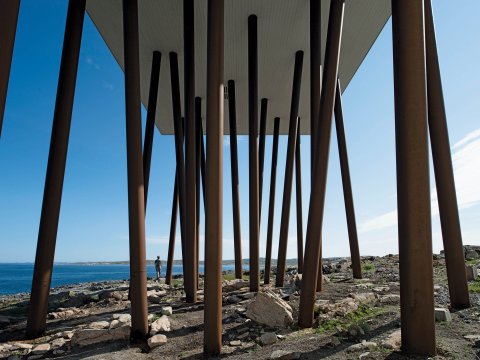
Fogo Island knows extinction too well. The great auk, a flightless bird that stood nearly 3 feet tall and vaguely resembled a penguin, was last sighted around 1844. The last member of the Beothuk tribe, the aboriginal people who inhabited Fogo Island and the surrounding area, died in 1829. The extinction of cod—not as a species but as a vital cog in the local economy—looked as if it might be a harbinger of extinction for the Fogo Islanders when Cobb left for Carleton University in Ottawa in 1975.
Over the course of the next quarter-century, the cod population around Newfoundland was treading water, thanks to a government-imposed moratorium on fishing. Meanwhile, Cobb, hyperintelligent and acutely observant, rose all the way to chief financial officer at JDS Uniphase, a fiber-optics manufacturing company. "I grew up with six brothers," she says. "I know how to handle boys. The business world was just bigger boys."
By the turn of the millennium, Cobb was the third-highest-paid female executive in North America. In 2001 she cashed out, exercising stock options worth $69 million and setting sail around the world on her 47-foot yacht, Bakeapple, named after arguably the tastiest of Fogo Island's 15 indigenous berries. (In one of many glorious quirks associated with Newfoundland, bakeapple is an English bastardization of the French baie qu'appelle, which translates to "What's the name of that berry?")
Three decades after Lambert Cobb, destitute, put his humble vessel to flames, Zita Cobb had accumulated more wealth than the entire population of Fogo Island—and a yacht that could circumnavigate the globe. Having reversed her family's fortunes, she set out to reverse her island's. In 2005, after spending four years adrift, in a manner of speaking, she set a course for home.
"Those white boats over there, we call them punts," says Al Dwyer, whose family has resided on Fogo Island since 1809. "Those were the primary fishing boats on the island for generations."
It is a glorious July afternoon as Dwyer, a retired teacher, takes me on a tour of the island, an amenity offered every guest at the Fogo Island Inn. No one fishes out of punts anymore, but in 2008 the Shorefast Foundation, the charitable trust that Cobb operates with two of her brothers, instituted the Great Fogo Island Punt Race, a seven-mile open ocean race. The idea was to save the punt, and the artisans who build them, from the fate of the great auk and the Beothuks.
Last year, Dwyer and his partner, Aidan Greene, rowed to a third-place finish and $1,000 in prize money. This year, Greene was unavailable, having been involved in a head-on collision with a moose while riding his Ski-Doo.
Because of Shorefast—named after the rope that tethers a crab or lobster trap to a post—the punt builders have work. As do the island's quilters, craftswomen such as Dwyer's wife, who make not only the quilts and pillows found in the Fogo Island Inn but other items (e.g., seal-skin slippers) that they sell from a guild hall just off the inn's property. "I'm not that big into charity myself," says Cobb. "There are only 2,700 people on Fogo Island. We could have gone around Fogo Island and handed everyone a little bag of money. But charity is not sustainable. For me, the most important thing is to optimize community."
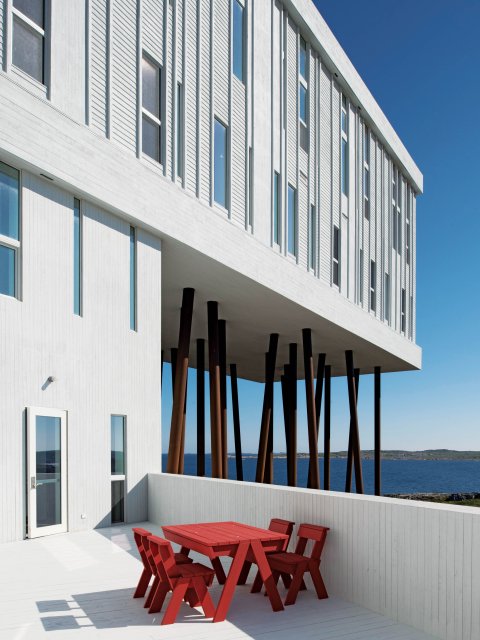
Cobb, fit and bright-eyed, likes to joke that you can tell a Newfoundlander in heaven "because they're the ones moaning and groaning that they want to go home." For her, home is a sense of place, and places, particularly rural areas, are losing their indigenous qualities.
"We live in a time where the idea of place is disappearing," says Cobb. "Never mind the mass migration into urban areas. There's a mass migration into cyberspace."
Speaking from inside the Fogo Island Inn's second-story cinema, where guests may request anything from a documentary film toHouse of Cards, Cobb points to a photo of a strip mall on the cinema screen. "The world is suffering from a plague of sameness that is killing human joy," she says. "After 5,000 years of human existence, why do we still build this shit?"
Because it's cheap? "And what is the price of cheap?" asks Cobb. She notes that Walmart is owned by a family named Walton, "but they don't remind me much of The Waltons."
Cobb is an unabashed economic evangelist, Dagny Taggart (from Ayn Rand's Atlas Shrugged) with a twist of social consciousness. There are no plans to expand Fogo Island Inn—there are no outside investors—and any surplus revenue is channeled back into the Shorefast Foundation, where it is used for micro-lending programs to Fogo Islanders hoping to launch business enterprises or to host visiting artists. She refuses to do business with any company whose goods are produced in a country that fails to honor fair labor or environmental protection laws. She can afford to do so.
Back inside the Fogo Island Inn, the meals are exquisite, the pampering will appease the most demanding sybarite, and the views leave you gob-smacked. Cobb's staff trained anywhere from four to 10 months before the inn opened its doors, and it shows. Why, though, does the Fogo Island Inn accommodate only a maximum of 60 or so guests per night? "We're a small community, we can only love so many people at a time," says Cobb. "Besides, 71 employees is a meaningful impact in this community."
What Cobb does not say is that the Fogo Island Inn's exclusivity, and its room rates, guarantees a certain type of guest. A guest who is potentially a Zita Cobb-type, perchance a CEO or a CFO or a hedge funder who, after a few days of counting icebergs and whales, of picking bakeapples and partaking in a communion between man and nature that is all too rarely enjoyed in the 21st century, has an epiphany: that she, too, may effect change.
"Nature and culture are the garments of human life," says Cobb, "and business and technology exist to serve human life. Somewhere along the way, we got it backward."
Zita Cobb would dearly love for you to stay at the Fogo Island Inn. But more than that, she wants the Fogo Island Inn to stay with you. In the meantime, she will just have to greet every sunrise knowing that her homecoming is spurring the island's resurrection.
"And," she says, a twinkle in her eyes, "the cod are coming back."



